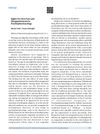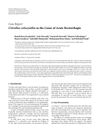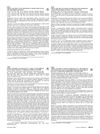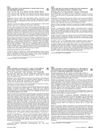 3 citations,
June 2014 in “Klinik Psikofarmakoloji Bulteni-bulletin of Clinical Psychopharmacology”
3 citations,
June 2014 in “Klinik Psikofarmakoloji Bulteni-bulletin of Clinical Psychopharmacology” The document concludes that there is hope for future psychopharmacology research despite challenges in treating schizophrenia.
 37 citations,
October 2006 in “Steroids”
37 citations,
October 2006 in “Steroids” New sulfur-containing steroid analogs show promise for more targeted medical treatments.
[object Object]  9 citations,
January 2013 in “Case reports in emergency medicine”
9 citations,
January 2013 in “Case reports in emergency medicine” Eating Citrullus colocynthis can cause severe intestinal bleeding and damage.
 2 citations,
January 2023 in “Plants”
2 citations,
January 2023 in “Plants” Plant bioactive compounds are important for health and can help prevent various diseases.
1 citations,
November 2011 in “British journal of pharmacology” Enzymes are classified into six types and are essential for many biological processes, with only a few targeted by drugs.
 October 2023 in “Journal of food chemistry & nanotechnology”
October 2023 in “Journal of food chemistry & nanotechnology” Jujube seeds have many health benefits and could be a valuable natural remedy.
 December 2024 in “International Journal of Research in Ayurveda and Pharmacy”
December 2024 in “International Journal of Research in Ayurveda and Pharmacy” Sowbhagya Chundi Legiyam helps postpartum women recover and prevent infections.
January 2023 in “Applied sciences” Equisetum debile extracts may help with skin whitening, anti-wrinkle, and anti-hair loss treatments.
 July 2023 in “Journal of Natural Remedies”
July 2023 in “Journal of Natural Remedies” Shell ginger contains kavalactones that promote hair growth and have anti-cancer, anti-inflammatory, and anti-obesity effects.
 183 citations,
January 2018 in “Cosmetics”
183 citations,
January 2018 in “Cosmetics” Essential oils in cosmetics can offer benefits but may cause allergies and should be used carefully.
 January 2025 in “International Journal of Advanced Research in Science Communication and Technology”
January 2025 in “International Journal of Advanced Research in Science Communication and Technology” Polyherbal hair dyes are safer and more eco-friendly than chemical dyes.
[object Object] December 2021 in “Asian journal of pharmaceutical and clinical research” The homemade hair oil made from natural ingredients helps hair grow, reduces hair fall, dandruff, and graying, and makes hair shiny with few or no side effects.
 1 citations,
July 2017 in “Journal of Pharmacognosy and Phytochemistry”
1 citations,
July 2017 in “Journal of Pharmacognosy and Phytochemistry” The study concluded that standardizing Thuja orientalis bark helps in its identification and quality control.
 September 2016 in “Elsevier eBooks”
September 2016 in “Elsevier eBooks” Different types of hair loss in dogs and cats have various causes and treatments, with outcomes ranging from good to uncertain.

False daisy is a medicinal herb with many health benefits, including hair growth promotion.
 8 citations,
July 2011 in “Critical reviews in analytical chemistry”
8 citations,
July 2011 in “Critical reviews in analytical chemistry” The document concludes that validated methods are needed to ensure the quality of fluconazole drugs and that new antifungal medications are necessary due to safety and resistance concerns.
 1 citations,
August 2023 in “International journal of pharmacy & integrated health sciences”
1 citations,
August 2023 in “International journal of pharmacy & integrated health sciences” Cosmeceuticals are popular for their skin health benefits and anti-aging effects.
 24 citations,
January 2020 in “International Journal of Molecular Sciences”
24 citations,
January 2020 in “International Journal of Molecular Sciences” Some plants with flavonoids may help treat hair loss and promote hair growth.
 46 citations,
January 2020 in “Theranostics”
46 citations,
January 2020 in “Theranostics” Injecting a special gel with human protein particles can help hair grow.
 22 citations,
October 2019 in “International Journal of Nanomedicine”
22 citations,
October 2019 in “International Journal of Nanomedicine” The nanoparticles improved hair growth and enlarged hair bulbs.
 29 citations,
September 2017 in “Oncology and therapy”
29 citations,
September 2017 in “Oncology and therapy” The document provides advice on how to recognize and treat skin-related side effects of cancer drugs known as EGFR inhibitors.
 27 citations,
December 2015 in “Mayo Clinic Proceedings”
27 citations,
December 2015 in “Mayo Clinic Proceedings” The document concludes that lifestyle changes and medical treatments can significantly reduce symptoms of Hidradenitis Suppurativa, a chronic skin condition.
 January 2024 in “Biological trace element research”
January 2024 in “Biological trace element research” Isotretinoin affects trace element levels and requires monitoring of liver and kidney functions.
 August 2018 in “Journal of The American Academy of Dermatology”
August 2018 in “Journal of The American Academy of Dermatology” Different treatments for skin conditions were found to be effective and generally safe, with biologics recommended as the first choice for generalized pustular psoriasis.
 165 citations,
January 2014 in “Dermatology Research and Practice”
165 citations,
January 2014 in “Dermatology Research and Practice” Zinc is effective for treating various skin conditions, including warts and acne.
 August 2018 in “Journal of The American Academy of Dermatology”
August 2018 in “Journal of The American Academy of Dermatology” Oral alitretinoin is effective for certain types of chronic hand eczema, with mild side effects.
 August 2018 in “Journal of The American Academy of Dermatology”
August 2018 in “Journal of The American Academy of Dermatology” Ozenoxacin 1% cream is an effective and safe treatment for impetigo in children and adults.
 29 citations,
January 2007 in “Dermatologic Clinics”
29 citations,
January 2007 in “Dermatologic Clinics” Photodynamic Therapy is an effective treatment for mild to severe acne.
112 citations,
January 2013 in “Experimental dermatology” Faulty Notch signalling may cause hair follicle changes and inflammation in hidradenitis suppurativa.
 7 citations,
May 2017 in “Research and Practice in Thrombosis and Haemostasis”
7 citations,
May 2017 in “Research and Practice in Thrombosis and Haemostasis” Some blood thinners can cause hair loss, but switching medications can stop it.


























